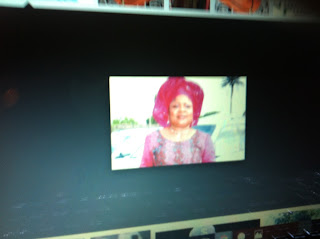BLACK SOCIAL HISTORY
SALAWA ABENI Artist Biography
b. Epe, Nigeria. A child prodigy of Nigeria’s Yoruba people, Abeni has, since the late 70s, been the acknowledged modernizer and leader of the women’s vocal and percussion style known as waka, a close relative of the male-dominated juju, apala and fuji musics. Her professional career began at the age of 10, when she walked into the Lagos offices of the local Leader recording label and asked to be allowed to play a demo tape. Treating the young girl’s request as something of a joke, the owner promised to listen to the tape later, put it away in his desk and promptly forgot about it. A few months later, visiting the nearby town of Epe, he saw hundreds of people lining up for admission to a society function where a 10-year-old girl was singing. Curious, he went along, to find Abeni, the girl who had visited him in his office, singing in a compelling and precociously mature voice. With her parents’ permission, he took her into the studios to record her debut, Late Murtala Muhammed, a tribute to the recently assassinated head of state, which became one of the bestselling Nigerian releases of 1976. In 1977, Abeni formed her own group, the Waka Modernisers, and by 1980 was one of the most successful artists in Nigeria.
In the mid-80s, a long quarrel with fuji star Kollington produced a succession of attacks and counter-attacks, in which Abeni lampooned Kollington, his parents and his relatives, along with his physical attributes (‘unpleasant lips, eyes like a prawn, a tendency to run away with married women’). The virulence of the exchanges allayed any suspicion that the whole affair was a mutually beneficial publicity stunt, but the origins of the acrimony remain obscure. In any event, the bile was buried in 1985, when Abeni recorded a tribute album to the recently deceased apala star Haruna Ishola, her bestselling release of the decade. She has subsequently recorded for the Kollington and Alagbada labels, and remains one of Nigeria’s leading live attractions.
SALAWA ABENI Artist Biography
b. Epe, Nigeria. A child prodigy of Nigeria’s Yoruba people, Abeni has, since the late 70s, been the acknowledged modernizer and leader of the women’s vocal and percussion style known as waka, a close relative of the male-dominated juju, apala and fuji musics. Her professional career began at the age of 10, when she walked into the Lagos offices of the local Leader recording label and asked to be allowed to play a demo tape. Treating the young girl’s request as something of a joke, the owner promised to listen to the tape later, put it away in his desk and promptly forgot about it. A few months later, visiting the nearby town of Epe, he saw hundreds of people lining up for admission to a society function where a 10-year-old girl was singing. Curious, he went along, to find Abeni, the girl who had visited him in his office, singing in a compelling and precociously mature voice. With her parents’ permission, he took her into the studios to record her debut, Late Murtala Muhammed, a tribute to the recently assassinated head of state, which became one of the bestselling Nigerian releases of 1976. In 1977, Abeni formed her own group, the Waka Modernisers, and by 1980 was one of the most successful artists in Nigeria.
In the mid-80s, a long quarrel with fuji star Kollington produced a succession of attacks and counter-attacks, in which Abeni lampooned Kollington, his parents and his relatives, along with his physical attributes (‘unpleasant lips, eyes like a prawn, a tendency to run away with married women’). The virulence of the exchanges allayed any suspicion that the whole affair was a mutually beneficial publicity stunt, but the origins of the acrimony remain obscure. In any event, the bile was buried in 1985, when Abeni recorded a tribute album to the recently deceased apala star Haruna Ishola, her bestselling release of the decade. She has subsequently recorded for the Kollington and Alagbada labels, and remains one of Nigeria’s leading live attractions.




































No comments:
Post a Comment